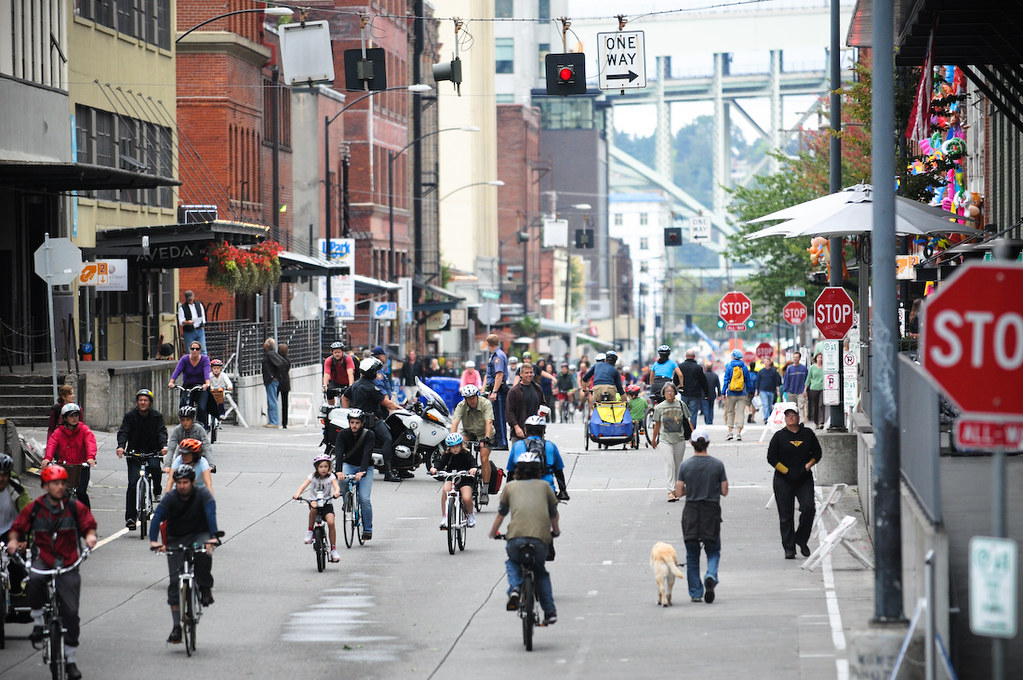
(Photo: J.Maus/BikePortland)
Sometime in the 1920s, the American auto industry worked very hard and very consciously to achieve a great victory: they successfully associated their product with freedom.
A machine that had been developed to power farm implements and long-distance travel became a way for the wealthy, and gradually for the less wealthy, to zoom and roar right through the middle of cities.
As documented by history professor Peter Norton’s 2008 book Fighting Traffic (and many links over the years in BikePortland’s Monday Roundup), many Americans — maybe most of them — didn’t see this as a blow in favor of freedom; just the opposite. They saw it as a takeover of city streets. Even in a world where many more people died of disease and violence than they do today, the public was shocked by the notion that a person’s freedom to zoom down a street could be more important than a child’s freedom to play in it.
“Children must play,” St. Louis resident C.C. White warned in a letter to the St. Louis Star in 1918. Five years later, a cartoon in that newspaper depicted a car as “The Modern Moloch,” a reference to an Ammonite god who supposedly required the sacrifice of children.
Here in Portland, the mayor, The Oregonian and the police department eventually teamed up to lead a nationally recognized campaign called “Let’s Quit Killing” that treated lethal driving as a private choice but a public problem. Similar movements had already been active in cities across the country.
In Cincinnati in 1923, the American movement against the automotive takeover of cities reached its high-water mark: 10 percent of the city’s population signed a ballot initiative that would have required “speed governors” in every car, devices that mechanically limited traffic speeds to a nonlethal 25 mph within city limits.
The auto industry, rightly realizing that without their big speed advantage cars would never be able to compete with streetcars and bicycles as popular ways to get around a city, poured money into lobbying the public for a “no” vote, referring over and over again to the idea that the law would build a “Chinese wall” around Cincinnati. By the time the campaign was over, fewer people voted for the law than had signed the petition.
It’s enough to make somebody wonder about the country that might have been.
Can you imagine what US cities would be like today if safety advocates of 1920s had successfully capped urban auto speeds to 25 mph?
— Michael Andersen (@andersem) June 16, 2015
In the years that followed, advocates of “motordom,” as they referred to themselves, pulled off their most famous trick: they used a derogatory American term for a country bumpkin, a “jay,” to coin a new word, “jaywalking.”
People using the street casually weren’t exercising freedom, the word implied. They were betraying ignorance and unsophistication. They didn’t belong in U.S. cities; cars did.
All of which hopefully explains why I was so intrigued, a few weeks ago, to notice this tweet:
Crossing the street is putting your life at risk at rush hour. Slow down, jaydrivers! https://t.co/jDcAmbsbOm
— Mark (@markecarter) June 17, 2015
And then this one:
#Jaydriver didn't "see" a TriMet bus? No ticket…Why not you ask? Nothing illegal about #jaydriving apparently. https://t.co/CFE6GzBCRy
— Mitchell Austin (@msaplanner) June 11, 2015
And also this:
Just witnessed two people #jaydriving on Clinton almost kill a person biking and walking. Help, @NovickOR ! We need a #SaferClinton!
— Bike Loud PDX (@bikeloudpdx) February 11, 2015
Have you had the prickling sense, lately, that the United States is in a new moment? That the Vision Zero movement and those like it are reviving some of the sense of outrage about the lost freedom of urban movement that almost no one still alive remembers?
Advertisement
Here’s when I felt the prickle: When I noticed that local activist Dan Kaufman had used an image from the Dutch Stop de Kindermoord movement on his Facebook event for May’s traffic safety demonstration on Southeast Powell Boulevard outside Cleveland High School.
The need for the demonstration made me feel sad. But the response to Kaufman’s quick organizing — and the hugely successful two months that Portland livable streets advocates have had since — have made me feel something else: patriotic.
I started to think that even though (unlike in the 1970s Netherlands) almost no one still alive remembers the streets of the 1920s, something big could be happening here in U.S. cities. And that this might be what it looks like.
So when I saw those “jaydriving” tweets, I scrolled through Twitter until I could figure out the people who seemed to be responsible for spreading the term. Then I emailed them to ask why they use the word. Here’s one of them: Mitchell Austin, the Bicycle and Pedestrian Coordinator for the City of Punta Gorda, Florida:
My first encounter with it was April of 2014 when @PedestrianError … used it in a Tweet. … I just started using it from then on as the situation seemed to cry out for it.
Unfortunately the need to use the term seems to occur all too frequently. The social disconnect that autocentric life causes combined with the distraction of all these little screens seems to have enhanced our propensity to do dumb things behind the wheel. The narcissism of blocking a crosswalk…because 5 feet further in my BMW is more important than your life…or the stress-anger stew car commuters sit in for hours a day…to earn a buck to pay for the car?!?!? It all just seems to be going off the rails for so many people.
I say all this not as some militant anti-car guy. I drive, heck I own two cars in a single driver household. However, there is no reason someone should have to buy, fuel, insure, and maintain a 4,000 lbs hunk of steel, rubber & glass in order to get around & earn a living.
And here’s the pseudonymous woman behind the the account @PedestrianError:
I can’t even remember all the folks who’ve used it. … I don’t think I’d use it on someone who was operating a motor vehicle in a city without breaking any laws or at least standard safety practices (like talking on a hand-held phone in a state that hasn’t yet outlawed it) and it’s certainly possible to jaydrive even in an area where a car might be the most efficient way to get around thanks to limited transit, dispersed land uses and/or lousy biking conditions. I see it more as reckless and/or incompetent driving, which is amplified in an area where no driving is really reasonable. I think use of the term has been waxing and waning for a while, probably slowly but unevenly gaining more traction. … I don’t think I picked it up from someone else but I definitely wouldn’t claim to be the first. It just makes sense.
The birth or rebirth of this little word on a social media platform is a small thing. Even the big idea behind the word — that thoughtless driving, not thoughtless walking, is out of place on city streets — isn’t enough to restore the independence Americans lost when we gradually handed city streets over to traffic and began to build our cities around our machines, not fully realizing the costs until it was too late.
But from a gradually spreading grassroots hashtag to a Portland dad worried about his children’s safety to residents mobilizing for a voice on their neighborhood association to one of America’s great cities announcing that despite our country’s choices in the 1920s, we no longer find traffic deaths to be an acceptable price to pay for speeed, the national movement for better streets that’s being built right now is showing signs of a very American attitude. It’s actually the same attitude that advocates of “motordom” had when they gradually wrested control of city streets, supposedly in the name of freedom, 90 years ago.
Independence isn’t something you receive.
Independence is something you declare.



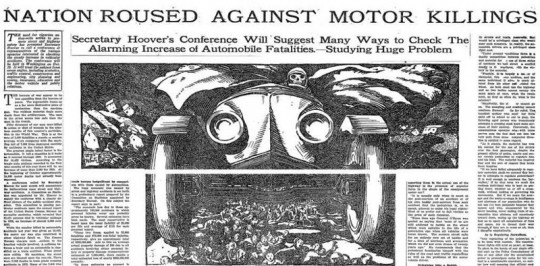
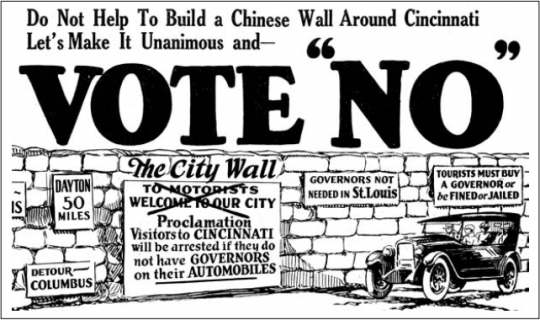


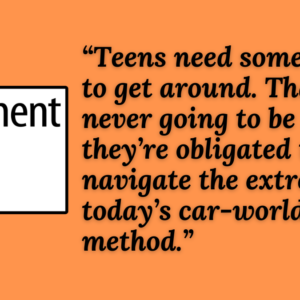


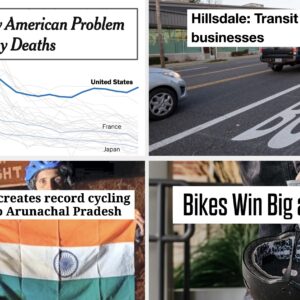
Thanks for reading.
BikePortland has served this community with independent community journalism since 2005. We rely on subscriptions from readers like you to survive. Your financial support is vital in keeping this valuable resource alive and well.
Please subscribe today to strengthen and expand our work.
And it will take more than just a couple dozen people showing up at some of these protest events. As in the Stop Kindermood, we need hundreds, thousands to show up and force a change by our civic leaders.
Can’t, got to watch the next episode of #GameofThrones before my twitter feed spoils it!
#AmericansAreDistractedBeings.com
Yes Paula. It will take a lot of cyclists in suits at city and county meetings to help sway the Jaydrivers in charge of the bureaucracy to change their minds or be gradually replaced by promising them support then not delivering any if they don’t change their attitudes.
I noticed in “Bicycling magazine” an article regarding Bogata Columbia and the fact that cyclists take over the streets on Sundays every week with over 1 million cyclists. The main problem That I see is the rest of the week Motorists get their way and an average of one pedestrian a day is killed and one cyclist a week. The fatalities are not on Sundays.
I’m so glad you posted this today, Michael. I’ve just been reading (well, listening to the audiobook of) Americans Against the City: Anti-Urbanism in the Twentieth Century by Steven Conn. He’s dug into 19th and early 20th century original sources to trace the links between anti-urban, anti-government, anti-density sensibilities and the rise of the political right. He paints a clear picture of why those links are so hard to break, and where the city-hatred came from that is so tightly tied to “motordom”.
Cars and highways are a big part of his discussion. I’m not done with it yet so I don’t know exactly where he’s leading me, but he’s opening my eyes to the deeper, earlier roots of anti-urbanism in the US. It’s discouraging to know just how far back the roots of our transportation and housing problems go (way before cars), and how intractable the divide is between car folks and new urbanists.
It’s a good read.
Sometimes I really do forget to state my point. In this case: “…and therefore how difficult the Vision Zero task before us is.” I’m thinking Conn’s book might provide some useful insights into the battle.
Sounds like a great reference, thanks!
American urban/suburban areas grew to their current sprawling size during the age of the automobile – the exceptions being perhaps downtown areas. The sheer size makes eliminating the automobile unattractive to the majority of people who have to move around the city. Public transportation cannot provide reasonable commute times for a reasonable cost for many people because of too many transfers. Commute times on buses/trains in the PDX metro area can be 2+ hours – compared to less than 1 hour in a car. Most are not willing to ride a bike in the rain, snow, or when it’s 90 degrees outside.
Thus, cars will be here until economic conditions are so poor that people can’t afford them, however, the form of cars may change to electric, self-driving, etc. Cars represent a convenience – a savings of time and avoidance of work and harsh weather – and most folks LOVE to drive their car – it’s perfectly normal to love cars.
Historical perspective via a short video from early America:
https://www.youtube.com/watch?v=8Q5Nur642BU
Fantastic video. Kind of like downtown Portland drivers.
Salmon jaydriver at 5:31.
I suspect, from my own experience of driving, that people love to drive in conditions like those shown in car commercials, and hate to drive in conditions like everyday urban reality. Whether they prefer to keep an air conditioned, stereophonic privacy chamber around them as they go from point A to point B is a completely different question.
But none of that has to do with Vision Zero, and I couldn’t spot anything in the article suggesting that people hate cars now, or are supposed to hate them in the future. You seem to be saying that because humans will always choose convenience and speed over discomfort or delay, Vision Zero is useless and road deaths will remain absolutely inevitable.
I don’t follow. Are you saying that nothing can be done? That there is no solution? That people’s perception of the attractiveness of the solutions should be the only measure of whether they’re worth pursuing?
Just saying that given the freedom to choose to drive or bike or take a bus/train, most people will choose to drive as long as they think they can afford it. As Oregon 111 commented below, even here in mild-climate Portland, only a very small percentage of people choose to commute by bike – and there are a lot of reasons for that.
Someday, gas prices may get high enough, or incomes low enough, or congestion so intolerable, that people choose to ride a bike. We aren’t there yet.
Transportation only contributes 13% of global greenhouse gas emissions, and cars are only a fraction of that 13%, so even getting rid of all cars isn’t going to make much difference.
Vision Zero, to reduce traffic accidents, is a good goal and more can and probably will be done to make cycling safer but it will be a slow process due to limited funds.
“Transportation only contributes 13% of global greenhouse gas emissions”
Well for the US, the transportation sector contributes 27% of GHG emissions, close behind emitter # 1, the electricity sector at 31%.
http://epa.gov/climatechange/ghgemissions/sources/agriculture.html
And light duty vehicles represent 16% of all US emissions, second only to coal fired power plants at 26%, the way it is broken out in this pie chart:
http://www.nature.com/nclimate/journal/v3/n5/images/nclimate1891-f1.jpg
As important as the GHG emissions reductions associated with kicking our addiction to the automobile is the pedagogic value of discovering that we can take control of, back out of, our climate-wrecking behaviors. Kicking the car habit is just a precursor to kicking the natural gas heating habit and the electric-cooling habit and the coal-fired-electricity habit.
9 watts says:
“Well for the US, the transportation sector contributes 27% of GHG emissions, close behind emitter # 1, the electricity sector at 31%.
http://epa.gov/climatechange/ghgemissions/sources/agriculture.html
And light duty vehicles represent 16% of all US emissions, second only to coal fired power plants at 26%, the way it is broken out in this pie chart:
http://www.nature.com/nclimate/journal/v3/n5/images/nclimate1891-f1.jpg”
reply:
I’ll buy your stats – US light duty vehicles ~ 16% of US GHG emissions. As of 2012, US CO2 emissions were ~16% of the global total: http://www.eia.gov/cfapps/ipdbproject/iedindex3.cfm?tid=90&pid=44&aid=8
Thus, using your US stats and my global stats, and assuming CO2 emissions are appx same as GHG emissions, USA light duty vehicle emissions calc out to be 0.16 x 16% ~ 2.6% of global total emissions. Oregon light duty vehicles would be about 1% of that or about 0.026% of world GHG emissions. I’m not too excited about that but sure, do what you can, drive a fuel efficient vehicle, bike, ride the bus, etc – it all helps a tiny, tiny, tiny amount in the global picture.
9 watts says:
“As important as the GHG emissions reductions associated with kicking our addiction to the automobile is the pedagogic value of discovering that we can take control of, back out of, our climate-wrecking behaviors. Kicking the car habit is just a precursor to kicking the natural gas heating habit and the electric-cooling habit and the coal-fired-electricity habit.”
reply:
The planet is fairly large and the interaction with the sun, etc is not fully understood so we cannot say for certain that we are wrecking the climate. We may be, but that isn’t known with certainty – but that’s another discussion.
What do you propose we use to replace natural gas heating and electric cooling and coal-fired electricity?
“The planet is fairly large and the interaction with the sun, etc is not fully understood so we cannot say for certain that we are wrecking the climate. We may be, but that isn’t known with certainty – but that’s another discussion.
What do you propose we use to replace natural gas heating and electric cooling and coal-fired electricity?”
No, actually it is extremely basic physics: black body radiation dictates that all objects in the universe both receive and transmit heat radiation. GHGs insulate the Earth and cause it to retain more heat over the long haul.
The sun is a giant ball of fusion-powered plasma that heats the Earth. ‘Nuff said.
Now, it is pretty trivial to retrofit our houses, office buildings and other dwellings to improve their heating and cooling efficiency to use roughly 90% less energy than we currently are.
http://architecture2030.org/2030_challenges/2030-challenge/
https://en.wikipedia.org/wiki/Passive_house
However, those are totally outside of the scope of riding bikes, and land squarely in the land of the architect and building scientist.
Not only not Nuff said, but not even a start. Yes, the basic physics of what MIGHT be happening is well understood. The radiation from the earth is not constant and how it varies is not well understood. How that radiation interacts with the magnetic field of the earth is not completely understood.
Most significant perhaps is the fact that the earths temperature goes thru cycles constantly even before our evil CO2 belching cars and industries existed. The planet has been warmer before machines than it is currently. It may very well be warming today – the problem is that NOONE knows what is causing it; and the irrefutable fact is that the earth is constantly either warming or cooling. It is profitable for some people to claim that man is causing it – they tax pollution, take the profit, buy jets and luxury homes/cars and pollute more. For other people they use the possibility that man is “wrecking the climate” to scare average folks into voting for them. Man may have very little to do with global warming/climate change.
Sure, some people have the money to super-insulate their homes, install massive solar PV and water heating systems to provide some of their needs; but the vast majority cannot afford it. So, no, it is anything but trivial.
Please describe for us the system you will use to heat your home in Calgary during a 2 week snowy, cloudy period, with no wind, no sun, and temperatures ranging from -30 F at night to -10 F in the day. Provide some numbers to back it up. No grid power and no fossil fuel allowed – it’s trivial so give us a peek into the future.
OOPS, I meant radiation from the sun. BUT while I’m here, it is true that the core of the earth also contributes to the heating of the earth.
Another thing that is being done on a large scale is scaring people into thinking humans are causing climate change and getting big money to study it. This is an entire industry of many thousands of people who’s paycheck depends on convincing governments that it must be studied and who must have this many millions of dollars to do research, fly all over the globe to collect data, purchase supercomputers to run climate models which, if we can only spend $10,000,000 more than last year, will be slightly more accurate. It’s a bunch of crap. The earth warms and cools continuously and has done so for millions of years. Why is that?
Same with the scientists studying the origin of the universe. There is NO possibility they will ever KNOW for certain how it came to be. BUT they will have mountains of data to back up their theories. Every once in a while the latest theory will be replaced by a newer and better one. 🙂
Not to say that they can’t learn some good things with all that research, but the inconvenient truth to remember is that these researchers lives, careers, families, mortgages, children’s education, their retirement, all depend on scaring enough people to convince someone to keep them funded.
Claiming that global warming is a plot hatched by those who stand to profit from it is, frankly, total bullocks. With a Nobel prize going to the first person to demonstrate that the observed changes in our climate are being driven by a different mechanism, surely someone in the scientific community would break ranks and present it.
I am sure I speak for everyone here — I fervently hope that global warming is just a money grab by scientists. But the evidence strongly shows that it is real, and it is caused by the release of fossil carbon into the atmosphere at unprecedented rates.
Where you are right is that efforts to reduce CO2 emissions made by individuals are unlikely to make any real difference one way or the other. Collective action is the only hope to change our course on this issue.
As one of those scientists who does study the carbon cycie, I am finding this section of the discussion hilarious. And also wondering how I seemed to miss out on all the money grabbing conspiracy meetings, because I could use some of that funding.
Anne. It may take a few years but objects like the Google car are, if not the next step, most assurably in the near future in personal transportation. The are designed around safety for cyclists, pedestrians and the occupants of the vehicles that are safe driving. They will gradually absorb the Jaydrivers.
https://www.youtube.com/watch?v=_8nnhUCtcO8
🙂
Yeah, I think the company that makes the most money when people surf the web is designing them to make sure people can have more time to surf the web, but that’s just my theory. 😉
Looked like “left hooks” were the greatest danger, and the street car was by far the safest place to be.
Thanks for sharing, fascinating!
And nobody going faster than 10 mph.
biky people are nothing but loser car-haters…
there is a reason why 95%+ of us prefer to drive…
why do I ALWAYS see so many cars in parking lots and never any bicycles?
lets have a ballot measure to ban cars – and total the results — I don’t think cars will be banned
Well, it’s true, I am a loser, though I don’t hate cars. I never did manage to buy a full sized house. It took me 40 whole years of work to get to retirement (I know that real winners retire in their 30s), and I had to settle for a state college to get a degree because I couldn’t win hard enough to go to Yale like I hoped. Just too loser-y for the Ivies. No gumption at all.
I believe you when you suggest that my own preference for not driving has to do with my loserdom in some direct causal way. But I’m curious: the other 95% who do prefer to own cars and drive? All winners? That’s a remarkably high percentage! I’d love to see your data source for that!
Kudos Anne. I don’t hate cars either. I split my traveling between my bike and driving my wife around in a striped title Mercedes. I worked my entire adult life until I retired at 67 with just Social security. I have ridden bicycles around Portland since 1953 when I was 8 years old. Enough of that!
The attitude of the majority of motorists is not too bad. Only about 49% are lethal. The other 51% of the motorists actually share the roads.
What a coinky-dink! Until it started gathering actual moss from non-use and I decided to sell it to a rock star, I had a Mercedes too! Nice wheels. But I’m a loser. What do I know?
so, when you have to fly somewhere do you prefer to ride in the airplane, in a seat with seatbelts and complimentary beverage service, or would you rather run along side and climb into the landing gear bay during take off?
convenient to talk about “preference” when the vast majority of americans aren’t presented with reasonable choices. selfish auto-interests saw to that.
no one here is asking that cars be banned. all we are asking for is better, safer choices.
and, if it weren’t obvious, you’ve already answered your question about parking lots. you’re not seeing any bicycles because parking lots are designed for cars. if you’re looking for bikes (rhetorical; i know you are not), you’ll have to look at businesses that aren’t surrounded by hot, subsidized wastelands built solely for the storage of cars.
Although, to be fair, I do park my bike at IKEA, at the very front of that vast sea of asphalt for cars.
This is fun.
“biky people are nothing but loser car-haters…”
Let me ask you: why has the number of bikey losers car haters skyrocketed in the past decade? Are there more losers now than there used to be? Or just more reasons to hate cars? What kind of a winner are you that you hang out reading loser car hater blogs and slinging epithets at them? Doesn’t look to me like what a winner would do.
“there is a reason why 95%+ of us prefer to drive…”
95% of us? Who’s is this us whom you’ve put in the denominator? I ask because I think the percentage of people who have a driver’s license is 68.5%.* I don’t think we know what the percentage of the population is who *prefer* to drive, but it could well be less than this share. And it may be worth recalling that the number and share of people 16-24 with licenses is falling, a lot.**
“why do I ALWAYS see so many cars in parking lots and never any bicycles?”
Hm. In parking lots? I wonder if your choice of sample plot might be to blame? Do you also wonder why you see so many chickens in chicken coops? Or pigs in a pig pen? We’ve built cars only infrastructure with our taxes and other funds for almost a century. I don’t think is should surprise you that a lot of people (who may love their cars or may be stuck having to use them) will park them in your parking lot. Have you looked at bike parking corrals? What do you see parking in them?
“lets have a ballot measure to ban cars – and total the results — I don’t think cars will be banned”
That is an interesting proposal, Oregon111. Is this supposed to be a parody of what you think loser-bikey-people want? Funny.
* http://www.fhwa.dot.gov/policyinformation/pubs/hf/pl11028/chapter4.cfm
** http://usa.streetsblog.org/2013/03/15/as-youth-driver-licensing-dips-again-a-focus-on-the-millennials/
Hee! Why do I see so many women in the restroom, and hardly ever any men?
Oh, and I prefer the spelling “bikey”, personally. I just checked my membership card, and yes, indeed, it says, “Bikey People Loser Club”.
Why do I ALWAYS see so many bicycles on bike racks and never any cars?
It would be interesting to be able to see, like on Facebook, the person who ‘liked’ this comment.
When you design every American city around the automobile and virtually no other consideration, people will drive.
So, you have New York City, where 8 million people ride the subway. Every. Day.
That’s 4 times as many people as live in the Portland Metro Area. Are you calling New Yorkers car-haters too?
How Un-American of you.
I AM SO HAPPY! I’ve finally been able to select an avatar! I’ve been a member of the Interstellar Losers Club (sci-fi/fantasy/genre nerds, basically) on LIveJournal since LiveJournal was a thing, and now I can use it here! Two losers’ clubs! OMG. I’ve arrived.
Okay, I’m done now. That was fun.
Ahem! Now that I’m done goofing around, can I just say that I love the photograph at the top of this article? I had to look twice to realize that it was actually a picture of Portland, and not Copenhagen or something.
And, further, I appreciate the Independence Day spirit of your post, Michael. Recent days have brought so much uplifting news on the national level, and I agree that a big change seems to be in the air locally, too. An awakening of sorts. I’m feeling hopeful of positive change in our streets for the first time in a good long while.
There are two huge difference between now and the 20’s that really shouldn’t be overlooked.
Unlike in the 20’s – It (the automotive) is now an established world wide industry. Other than the military industrial complex, there is no bigger industry. It’s tentacles are wrapped around oil, mining, recycling, chemical/material, textiles, tech, banking, insurance, banking, construction, real estate and even media. Very few if any other industry has as many other industries tied to it for their success.
And as silly as it might seem, people still see the automobile as part of the American dream, and many place a lot of the definition of themselves into what they drive.
And quite frankly, I’m still not convinced that Vision Zero (here – it has definitely had some good results elsewhere) isn’t just a ploy to get citizens to lay on some political pressure to secure more DOT funds, only to have most those dollars them diverted to highway projects. It’s going to take more than some signed pieces and of paper and a couple jersey barriers to convince me otherwise.
Though I also have hope, because all of this that we’ve done for cars has occurred in less than 100 years (really it didn’t take off huge until after WWI). All that most of us know and grew up with, is really just a spec on a pinhead in history, and if all this car culture can be built in 50-80 years, it can be dismantled even faster.
“if all this car culture can be built in 50-80 years, it can be dismantled even faster.”
True, but I’d suggest for perhaps slightly different reasons than you’re suggesting. The ideological and financial and political momentum behind the automobile isn’t something you can (expect to) reverse in any sense of that word I can think of. Most of this upward momentum dovetails with the rewards our system spits out for lots and lots of the participants along the way. Reversing this will, I suspect, be associated with losses, disappointments, anguish for those involved.
But that is not to say it won’t be dismantled even faster; just that the dismantling will occur over the objections of those invested in that trajectory.
64% of americans do not believe global warming will pose a serious threat to their way of life in their lifetime (Gallup poll). When the denial collapses so will our hydrocarbon-based economy.
“When the denial collapses so will our hydrocarbon-based economy.”
🙂
Our hydrocarbon-based society will get kicked out of its orbit for good, but I’m not sure at what point the denial rates will ebb. It could well be during or after.
I’m afraid that teh Earth will be become uninhabitable long before we run out of oil… with fracking and shale oil, the peak oil curve has turned upside-down (for the time being).
That being said, India and Chinese oil consumption and competition will drive prices high enough so that the average middle-class American family will be really hurting at the pump if they want to keep driving an internal combustion, gas powered car. So… electric will our future be.
The thing I wonder about is how will we provide food for the teeming hordes. All of our food is currently produced using large quantities of fossil fuel.
I agree, I don’t think the industry, or those so closely tied to them -will simply lay down – they didn’t then and they won’t now. And if it happens too fast, you can likely expect pushback from places you’d never expect. I doubt those “invested” will make it easy.
As an example, let’s say things really take off here locally, and banks started taking a hit as a result, car sales start dropping like a brick. Perhaps S&P would downgrade Portland’s bond rating, making it harder for the city to get loans to invest in its bicycle infrastructure.
Perhaps your boss takes offence that you ride your bike to work, and starts the paperwork trail to fire you because their spouse is about to lose their automobile related job from lack of demand.
And of course news media facing revenue losses (car advertisers is one of their largest ad markets) could start tainting the movement too – more so than they do now.
Though the easiest route would be that since most bicycles are manufactured at a fairly small number of factories, they could simply buy the factories and the companies that own them and dismantle them, as they did with street cars back in the day.
Which is why I brought up how big of an industry the automobile is, It can attack from just about anywhere, at any time, in just about anyway it wants too.
Ford’s folding electric modular (concept) bike. If it’s a gentle transition, we might see more of this. I can’t see them all surviving gently to the end though.
freedom isn’t free…
corporations bought the roads in a hostile takeover…
activists are using sweat equity to take them back to a co-op status…
It’s been happening more and more though ever since peak-car.
And I totally assume that the auto industry is infiltrating The Netherlands to work on dismantling their cycling infrastructure that’s been inspiring the world. They’d have to be sneaky about it but they’re sneaky types.
This explains a lot of odd reactions that some people have. I was recently asked, after it was noticed that I biked to someplace, if I was one of those anti-car kinds of cyclist or a frugal person kind of cyclist. I hadn’t heard this idea before that someone could be anti-car. It must be a new myth developed recently. Like how years ago, it was thought that Lesbians hated men. In a heterosexist worldview, it would explain why they’re attracted to women. (As opposed to just lack of interest in men.)
Same thing with this belief. In a car-centric worldview, someone cycling therefore must hate cars. It’s a way of making sense of something instead of trying to understand the diversity of the world.
Anyone who thinks that cyclists hate cars must be reading too much Bikeportland dot org. A high percentage of comments express exactly that sentiment. Sad but true.
Do most cyclists hate cars? I don’t think so -most cyclists own cars; but the comments on this website paint a different picture.
We don’t hate cars, we just want their drivers to stop killing people with them. There are a lot of common sense changes that would help reduce the 30,000+ lost American lives each year. Unfortunately, many car-heads view these ideas as an attack on their freedoms. If I am anti-car, then that makes them pro-death.
I read the comments on this site a lot. I think in the years I’ve been reading, there have been two or three people who have stated that they hate cars. So out of the thousands of comments, and hundreds or at least 10s of people who comment, only 2 or 3 people have claimed to actually hate cars.
Most of the commenters appear to hate being in danger from inattentive, angry, law-breaking individuals who happen to be driving something at the time. The actions of the people doing to driving are the problem, and the comments reflect that. Sure, a high percentage of the comments talk about the actions of the drivers, but not hating the vehicle themselves.
people see what reinforces their world view better than what does not. People are hard-wired to remember the negative more than the positive.
I don’t hate cars. I believe in using the proper tool for any given task. Well over 50% of automobile travel is too much tool for the job.
Do I want to curb automobile use? Yes, the way the automobile is currently used by most people for purposes at its most inefficient and wasteful level. You don’t need a 12 lbs sledge hammer to install a push-pin on a cork board.
Yeah. Drivy people are nothing but loser bike-haters? The polarized thinking is easy, but so is borrowing money. Rolling around in the bank’s property is at least half as cool as a borrowed budnitz.
We should convince the banks (and insurers) to require blackboxes in any car with a lien. Surely governors will follow soon enough.
I like your thinking Eric. Soon banks and insurance companies might require Google driven cars.
🙂
https://www.youtube.com/watch?v=_8nnhUCtcO8
So far, the crashes reported for autonomous vehicles have been all human error – mostly other people running into the autonomous car.
Insurance bottom line will drive the change – a premium will be tacked on to those that don’t have the technology.
I don’t know if any of you saw the Tour de France this weekend, but judging from the amount of cycling infrastructure I saw I’d say the Dutch are the real winners here…
“They were betraying ignorance and unsophistication.”
Portraying?
No, they had everyone fooled until they “jaywalked”; that action betrayed them as ignorant and unsophisticated.
From Merriam-Webster:
“4 a : to reveal unintentionally
b : show, indicate
c : to disclose in violation of confidence “
I don’t actually care too much about what other people do with their money. I hope that they would feel the same about me. What I do want is more choice in all matters. When it comes to transportation, I want to be able to choose between a selection of modes and not be forced into only one option. This is what the velorution is really all about.
If you think climate change is a scam, I feel sorry for you.
Quote:
“Chris July 6, 2015 at 10:41 am
Claiming that global warming is a plot hatched by those who stand to profit from it is, frankly, total bullocks.”
reply:
This graph of earth temperature based on Antarctic ice cores going back 800,000 years proves conclusively that the current global warming hysteria is a hoax. Enjoy:
https://en.wikipedia.org/wiki/Temperature_record#/media/File:EPICA_temperature_plot.svg
Read just the first 2 paragraphs of this article to see how important it is to the Global Warming scientists, and to politicians, that people stay frightened about GW. To summarize, per paragraph 1 – in 2012, the IPCC reported there had been NO warming for the past 14 years. NOAA needs fear to get $$ to fund GW research, and the Democrat party needs YOU DEAR READERS to be horrified about GW so you’ll vote for them; so, what did the government have NOAA do? They refuted the IPCC report based on “recalibrated data” and by adding MORE data for 2 more “hot” years (2012-2014).
This is hilarious stuff, but this is only the tip of the iceberg. No pun intended.
Here’s the link:
https://www.climate.gov/news-features/climate-qa/why-did-earth%E2%80%99s-surface-temperature-stop-rising-past-decade
You can’t make this stuff up. 🙂
As much as I’m probably going to regret this, you’re correct that there was no significant warming from 1998-2012. However, you are conveniently ignoring the long-term trend presented in the figure that shows the steady increase in the global temperature anomalies (warmer than the long-term average) over the past 60 years.
http://www.scientificamerican.com/article/no-pause-in-global-warming/
This one is a little longer trend. The planet is doing what it has always done but the scientists will not admit it – if they did they would be out of a job and politicians (who fund them) would not be able to scare people to gain the power to gouge them with high taxes, funnel money to their buddies in alternative energy, etc, etc, etc, etc. Don’t get me wrong – we need alternatives to fossil fuels simply because they will get scarce some day, and extracting them is invasive in some cases; but the powers that be should quit lying to the people about GW.
https://en.wikipedia.org/wiki/Temperature_record#/media/File:EPICA_temperature_plot.svg
That’s just silly. Scientists would find other things to study.
Did you see the graph of their best estimates of earth temperature for the past 800,000 years? It goes in cycles and we’re right on target for another warm spell. Looks like the cycle periods are about 125,000 years.
https://en.wikipedia.org/wiki/Temperature_record#/media/File:EPICA_temperature_plot.svg
You would expect short term cooling spells, flat spells, and warming spells within the 125,000 year cycle. Those happen for reasons similar to why we’ve seen the recent 14 year flat spell – that’s what planets do – they are not static. The scientists at NOAA tripped all over themselves to explain the reasons for the 14 year flat spell; but will not admit that similar reasons are causing the heating trend seen since 1975.
https://en.wikipedia.org/wiki/Temperature_record#/media/File:EPICA_temperature_plot.svg
Humans are escalating global warming. That’s no hoax, but rather, is a possibly inescapable reality.
Antarctic ice cores going back 800,000, prior to the most recent, say 150-200 years, don’t include any indication of coal burning emissions of the level that humans have produced them over the last 150-200 years…or motor vehicle emissions during the same recent years.
Rather than by natural earth cyclical processes, it’s humans that have produced their own methodically accomplished deforestation of millions of acres of forest on multiple continents, in addition to other incidentally occurring havoc; millions of years old icebergs are melting away at unprecedented rates. Goodbye to glaciers around the world, even here on our own Mt Hood. Snow caves are going away.
Humans have made a mess of things. Haven’t seen the George Carlin video, but from, I think, and interview he did years back, I remember him saying something on the order of: ‘The planet’s not going anywhere…we are.’. It’s getting time to either wise up about the mess humans are making, or get ready to watch them start going away at a faster and faster rate.
History of 800,000 years says otherwise. We are due for a peak in global temperatures so it could happen, although lately the temperature rise has been quite moderate. The trend is being used by politicians to get votes and by scientists to get money – and the politicians are happy to give the scientists the money so they can point to the studies and keep people terrorized into voting for them. It’s a total scam.
https://en.wikipedia.org/wiki/Temperature_record#/media/File:EPICA_temperature_plot.svg
Those snow caves that collapsed recently do that every year – only this year people happened to be hit by the debris. The snow the caves were in was just snow that piles up each year at the bottom of avalanche chutes. Streams of water flowing under the snow pile melts the snow making a cave. Happens most years in many places in the mountains.
This is good! 🙂
George Carlin on Global Warming:
https://www.youtube.com/watch?v=BB0aFPXr4n4
This article on Arctic sea ice melting from November 22, 1922 is better than sex for a GW denier. More proof of the absurdity of claims of human-caused GW: (all true per snopes)
http://www.snopes.com/politics/science/globalwarming1922.asp